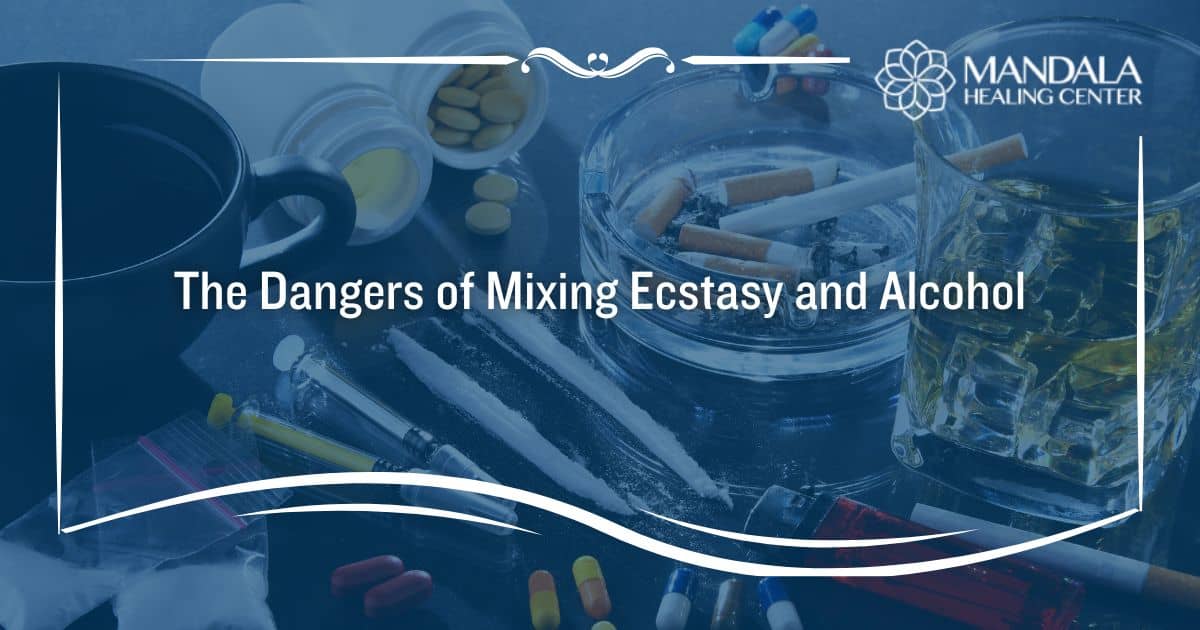Drug and alcohol abuse is hard on your body and mind. People who regularly abuse drugs or drink heavily can suffer short- and long-term mental and physical health consequences and face life-altering social, legal, and financial problems.
Mixing mood-altering substances can have serious, sometimes life-threatening complications. Using ecstasy and alcohol simultaneously is hazardous to your immediate health and safety and can result in lingering mental and physical health consequences.
Individually, ecstasy and alcohol can cause unwanted or dangerous side effects. Combining them increases the likelihood of harm and puts users at greater risk of complications, overdose, and death.
Combining mood-altering substances can be a sign that you need substance abuse treatment. Reach out to the caring professionals at the Mandala Healing Center to explore our holistic substance abuse treatment programs or to find help at any point in your recovery journey.
The Effects of Ecstasy
Ecstasy is a synthetic drug most commonly available in pill form. Ecstasy pills are often brightly colored and may have a logo or picture printed on the tablets’ surface. This popular club drug, which is also known as MDMA, can also come in a liquid or powder form.
Ecstasy is a substituted amphetamine that produces both stimulant and hallucinogenic effects. Users may take ecstasy to fuel long periods of partying at clubs or music festivals. In addition to more energy, the drug’s effects include:
- Heightened senses
- Increased sense of well-being
- Sociability
- Deeper empathy
While many of the effects of ecstasy are perceived positively, it can also have some unpleasant and unwanted side effects. These include:
- Nausea
- Chills
- Anxiety
- Paranoia
- Disturbing hallucinations
- Rapid breathing
- Increased heart rate
- Overheating
- Sweating
- Muscle tension
- Involuntary eye movements
- Blurred vision
- Clenched jaw or teeth
- Lightheadedness or feeling faint
People often use ecstasy in hot, crowded environments like nightclubs or large music events. The combination of the drug’s effects and the heat can quickly lead to deadly overheating. Many deaths attributed to ecstasy use are a result of heatstroke.
Long-term ecstasy use can cause long-term effects, including:
- Depression
- Anxiety
- Confusion
- Insomnia
- Memory issues
Mixing ecstasy and other mood-altering substances can worsen ecstasy’s harmful side effects.
What Are the Effects of Alcohol?
Alcohol is among the most commonly-abused substances in the world and is widely available in many places in the United States. It is common for people to drink alcohol in many social settings, celebrations, and with meals. Many people drink alcohol for its relaxing or mood-altering effects.
But alcohol can also cause other unwanted effects immediately and in the long term.
In the short-term, alcohol’s effects include:
- Lowered inhibitions
- Drowsiness
- Relaxation
- Mood changes
- Slurred speech
- Changes in perception, vision, and hearing
- Poor coordination
- Difficulty with decision-making and focus
- Gaps in memory
- Impulsive behaviors
Some effects of alcohol develop as people drink more, but some, including lowered inhibitions and relaxation, can appear after just one drink.
The long-term effects of alcohol abuse include:
- Mood changes
- Irritability
- Anxiety
- Weakened immune system
- Sexual dysfunction
- Appetite changes that result in weight gain or loss
- Poor memory
- Trouble focusing
- Interpersonal difficulties
People who drink heavily or frequently are also more likely to develop some chronic diseases, including liver damage, certain cancers, heart disease, and brain damage.
Alcohol is a central nervous system (CNS) depressant that slows CNS activity. It is important to avoid mixing alcohol and ecstasy or other mood-altering substances. You must also ask your doctor if it is safe to drink alcohol while taking prescription medications, supplements, or over-the-counter drugs.
Mixing Ecstasy and Alcohol: Understanding the Risks
Ecstasy and alcohol are often found in the same environments, such as parties or nightclubs, and they are the most likely to be used simultaneously. But mixing ecstasy and alcohol can be dangerous. Here are some of the most common complications of mixing MDMA and alcohol.
Hyponatremia
People who use ecstasy may sometimes drink water excessively, causing a dangerous dip in their sodium levels and swelling in the brain. Hyponatremia means having too little sodium in your blood, which can occur if you drink too much water.
Signs of hyponatremia include:
- Confusion
- Muscle weakness
- Confusion
- Lethargy
- Seizures
- Coma
Hyponatremia is a life-threatening condition that requires immediate medical intervention.
‘
Hyperthermia
Mixing ecstasy and alcohol can increase your risk of developing hyperthermia, which means your body temperature is dangerously high. Drinking alcohol while taking ecstasy can make people consume fewer fluids than they need and be much more active than they would typically be. This can lead to overheating and dehydration.
Depression
Ecstasy works by forcing your brain to churn out a flood of dopamine, which is a neurotransmitter associated with pleasure and reward. People who use MDMA often experience a “crash” afterward and experience depression, lethargy, fatigue, and poor appetite. Heavy alcohol use is also linked to an increased risk of depression. Those who frequently combine Molly and alcohol may be significantly more likely to develop depression and suicidal thoughts.
Find Help Now
If you use ecstasy and alcohol or need treatment for other substance abuse, contact the Mandala Healing Center specialists today to explore our holistic programs. Don’t wait another day for the help you need. Start your journey toward a healthier, happier life by calling us now.
References:
- National Institute on Drug Abuse (NIDA): MDMA (Ecstasy/Molly) Drug Facts, Retrieved July 2023 from https://nida.nih.gov/publications/drugfacts/mdma-ecstasymolly
- U.S Drug Enforcement Administration (DEA): Ecstasy or MDMA (also Known As Molly), Retrieved July 2023 from https://www.dea.gov/factsheets/ecstasy-or-mdma-also-known-molly
- Journal of Neuropsychopharmacology: Acute Effects of 3,4-Methylenedioxymethamphetamine (MDMA) on Behavioral Measures of Impulsivity: Alone and in Combination with Alcohol, Retrieved July 2023 from https://www.nature.com/articles/1300894












